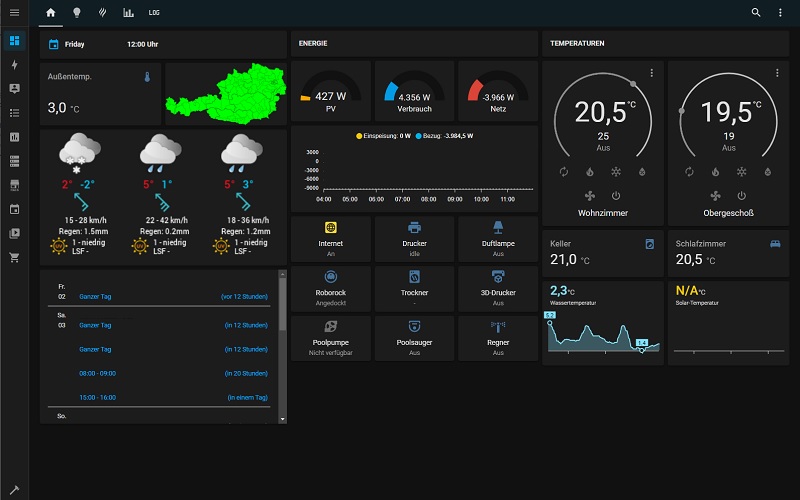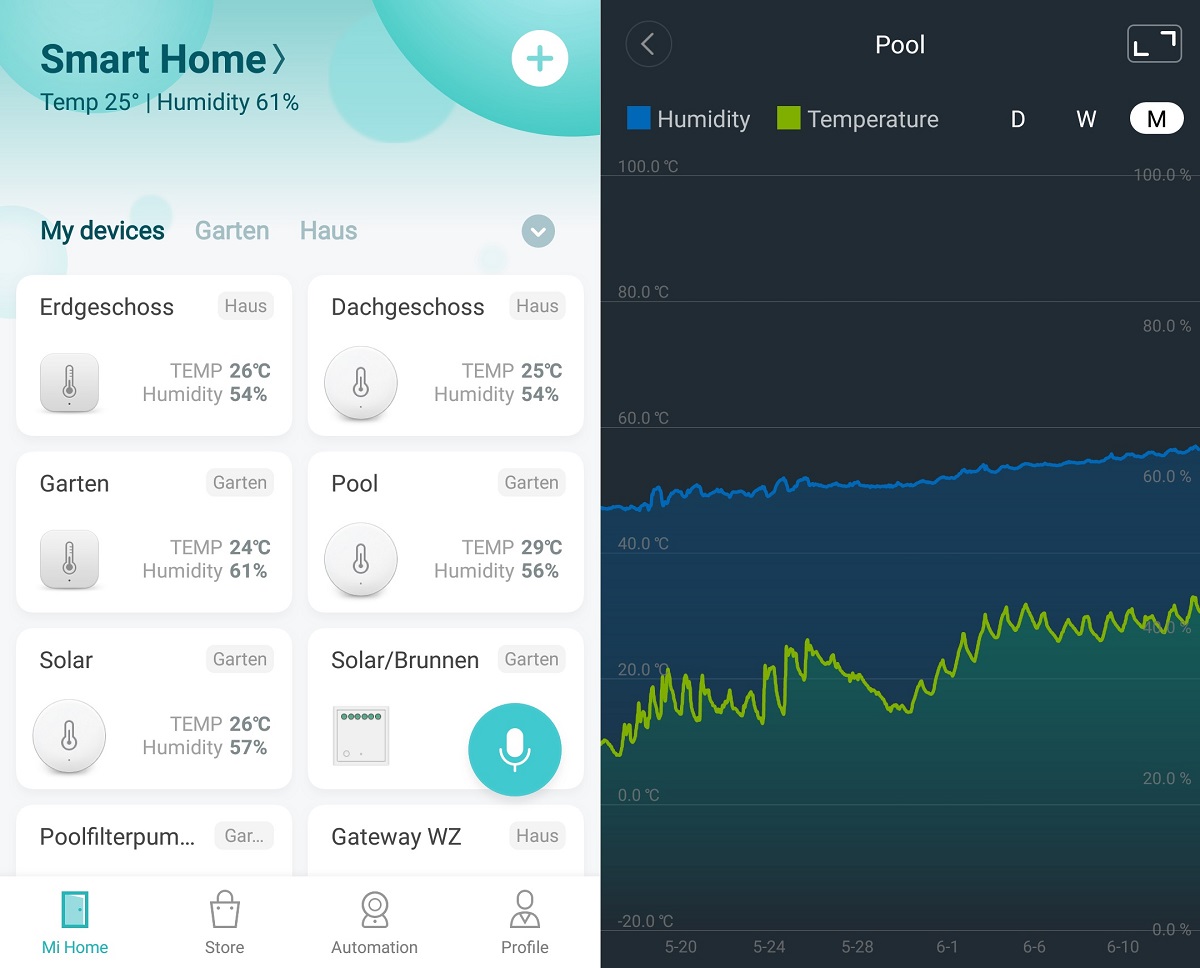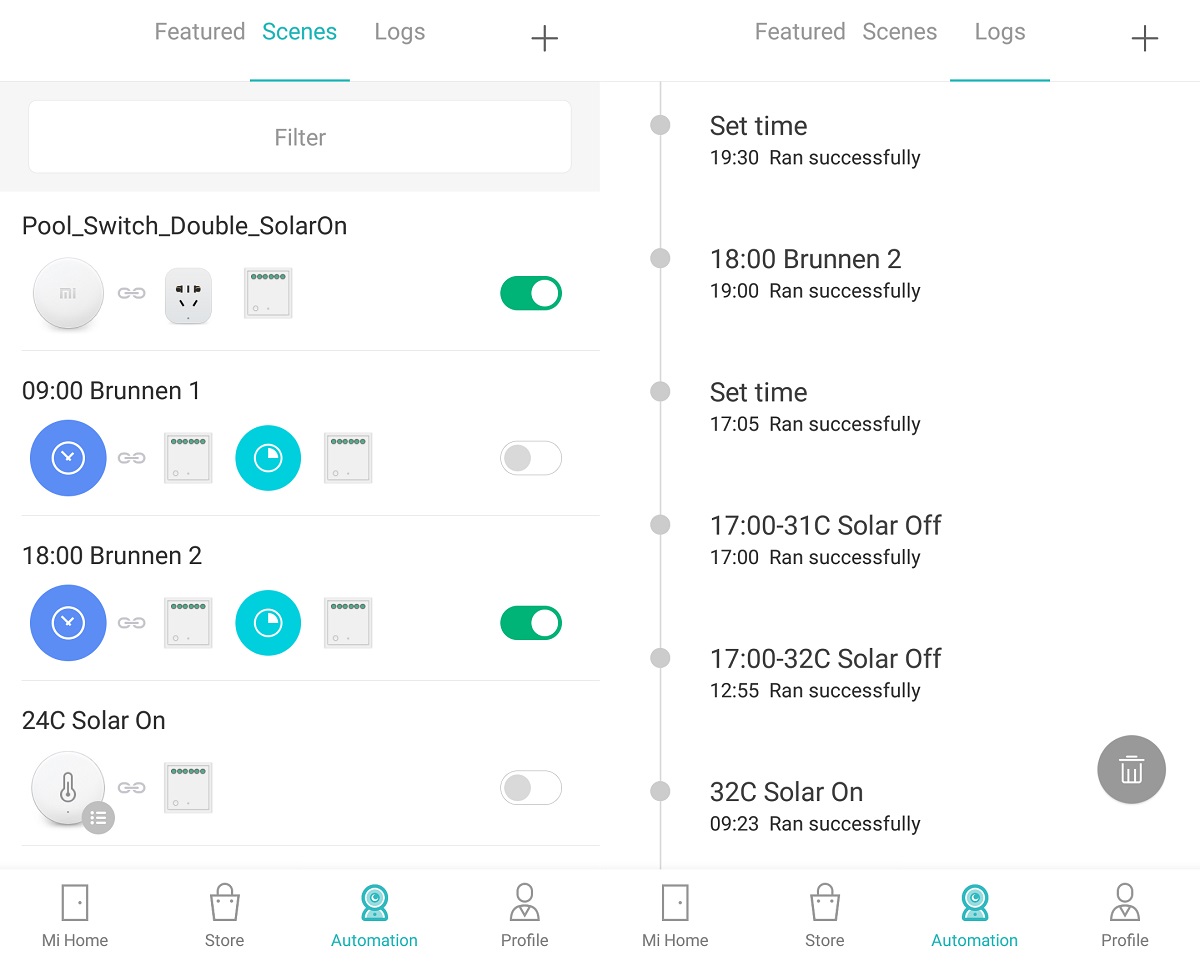Letztes Update / Last Update: 19-04-2021
Jump to English VersionSmart Home (de)
Hardware
- Xiaomi Mi Gateway (oder Raspberry Pi als Zigbee Gateway)
- Xiaomi Aqara Atmos Thermometer (inkl. Luftfeuchtigkeit und -druck)
- Xiaomi Mijia Thermometer (inkl. Luftfeuchtigkeit)
- Xiaomi Mijia Zigbee Steckdosen mit EU-Adapter
- Xiaomi Mijia Smart Wireless Switch (Schalter)
- Xiaomi Aqara 2-Kanal Relais
- Synology DS220+ NAS (Home Assistant Docker)
Software
obenHab vs Home Assistant (Hass.io) vs Domoticz
Früher lief Domoticz auf meinem alten Synology DS215j NAS. Domoticz bot alle notwendigen Möglichkeiten und hatte dabei einen geringen Ressourcenverbrauch.
obenHab war leider aufgrund der fehlenden Sicherheitsfunktionen und des Ressourcenverbrauchs nicht ideal auf dem alten NAS. obenHab würde allerdings mehr Plugins, Hardwareunterstützung und Funktionen anbieten als es Domoticz derzeit macht.
Home Assistant bietet einen noch größeren Funktionsumfang wie obenHab und läuft derzeit auf einem Synology DS220+ NAS als Docker Image.
Zigbee Gateway
Es gibt zwei Möglichkeiten die ZigBee basierten Sensoren und Aktoren mit dem Smart Home System zu verbinden: via Xiaomi Gateway oder Raspberry Pi Eigenbau-Gateway
Xiaomi Gateway
Diese Lösung ist auf unterstütze Hardware limitert (aber nicht nur Xiaomi Hardware). Es ist eine Cloud-Lösung die mit chinesischen Servern kommuniziert (aktueller Stand). Nach der Installation sollte daher die Kommunikation des Xiaomi Mi Gateway mit den Servern unterbunden werden. Dies geschieht mit Hilfe entsprechender Regeln in den Router-Einstellungen.
Raspberry Pi Gateway
Offene Lösung, etwas teuerer und zeitaufwändiger.
Mehr folgt in Kürze.
Anmerkung:
Als Amazon- und Banggood-Partner verdiene ich an qualifizierten Verkäufen.
Smart Home (en)
Hardware
- Xiaomi Mi Gateway (or Raspberry Pi as Zigbee Gateway)
- Xiaomi Aqara Atmos Thermometer (incl. humidity und pressure)
- Xiaomi Mijia Thermometer (incl. humidity)
- Xiaomi Mijia Zigbee Smart Sockets with EU adapter
- Xiaomi Mijia Smart Wireless Switch
- Xiaomi Aqara 2-Way Relay
- Synology DS220+ NAS (Home Assistant Docker)
Software
obenHab vs Home Assistant (Hass.io) vs Domoticz
Domoticz was running as smart home software on my old Synology DS215j NAS. It offered all the needed features and has only little resource consumption.
obenHab was unfortunately not ideal on the old NAS because of the lack of security and the high resource consumption. However, openHab would offer more plugins, hardware support and features than Domoticz currently does.
Home Assistant offers a even higher range of functionality as openHab and is currently installed on a Synology DS220+ NAS as Docker image.
ZigBee Gateway
There are two way to connect the ZigBee based sensors and actuators to your smart home system: via Xiaomi Gateway or self build Raspberry Pi Gateway
Xiaomi Gateway
This solution is limited to supported devices (but not only Xiaomi hardware). It is cloud based with chinese servers (current state). So after the installation of the system the communication of the Xiaomi Mi Gateway with the servers should be prevented. This is done with the help of appropriate rules in the router settings.
Raspberry Pi Gateway
Open solution but more expensive and time consuming.
More will follow shortly.
Remark:
As an Amazon and Banggood Associate I earn from qualifying purchases.



